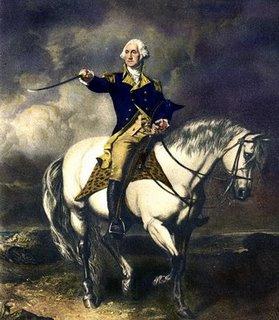Related Topics
Montgomery and Bucks Counties
The Philadelphia metropolitan region has five Pennsylvania counties, four New Jersey counties, one northern county in the state of Delaware. Here are the four Pennsylvania suburban ones.
Revolution in New Jersey
Early, brief but significant.
Using the Delaware River as a Weapon

|
| George Washington on a Horse |
After the Battle of Trenton, Washington emerged as a remarkably bold and creative General. In this battle of maneuver can be seen the elements of audacity, timing and courage that were notable in Stonewall Jackson, George Patton -- Virginians, both -- the Normandy Invasion, and the Inchon Landing. He forged, if he did not create, the American military tradition of inspired risk-taking. And he did it with a collection of starving amateurs, up against the best Army in the world at the time. Probably without realizing it, his coming victory at Trenton also gave Benjamin Franklin in Paris a major enticement to the French King to support the American cause. Washington produced a significant achievement, but just to make sure, Franklin exaggerated it just as much as he could.
On December 21, Washington thought Howe was immediately going to sweep on through Trenton to Philadelphia. In a day or two, he saw that wasn't the plan, organized the famous re-crossing of Delaware in horrible weather, and caught and captured a thousand Hessians with a three-pronged attack which cut off their retreat and made resistance useless. Nowadays, the event is marked by a reenactment on Christmas Morning, although it took place on December 26, 1776. The timing did not have to do with religious observance, it had to do with hangovers. To the great disappointment of his troops, he made them abandon the great stores of booze in Trenton because a second detachment of Hessians was in nearby Bordentown, and retreated back to the Pennsylvania side of the river. As you might imagine, Howe's Cornwallis promptly came charging down from New Brunswick to exact bitter vengeance. Instead of trying to rescue their comrades in Princeton, the Bordentown Hessians took off for New Brunswick. Defiantly, Washington taunted his enemies by again recrossing Delaware to the New Jersey side, putting up fortifications, just waiting for them to make something of it.
Well, that's the way it was meant to seem. On the night of January 2, the two armies were facing each other with about five thousand men on both sides, but with the British much better trained and equipped. The Americans had the advantage of not being exhausted by a fifty mile forced march, except for about a thousand who had been deployed forward to skirmish and delay the British advance with sniping from the bushes. The Americans made a great deal of noise and had many bonfires behind their fortifications. But when they advanced the next morning, the British found out where the Americans really were by hearing distant cannon fire coming from Princeton, ten miles away.
Washington had slipped five thousand men wide around the enemy flank during the night and had taken a parallel country road to Princeton where a major detachment of British was then defeated at the Battle of Princeton. An infuriated Cornwallis wheeled his army around in pursuit, and the race was on for the supplies left undefended in New Brunswick. Washington might have been able to get there first, except his men were too exhausted, and he was afraid to risk his long-run strategy, which was to avoid head-on collisions with the main British Army.
So Washington went into winter quarters in nearby Morristown, and thousands of British soldiers were thus bottled up in winter quarters in Perth Amboy and New Brunswick, where scurvy, lack of firewood and smallpox gave them a few months to consider their miscalculations. But the most important action of all was getting the news to Benjamin Franklin in Paris, to tell the French king of the victory. Franklin even dressed it up a little.
.
Originally published: Monday, September 20, 2010; most-recently modified: Tuesday, May 07, 2019